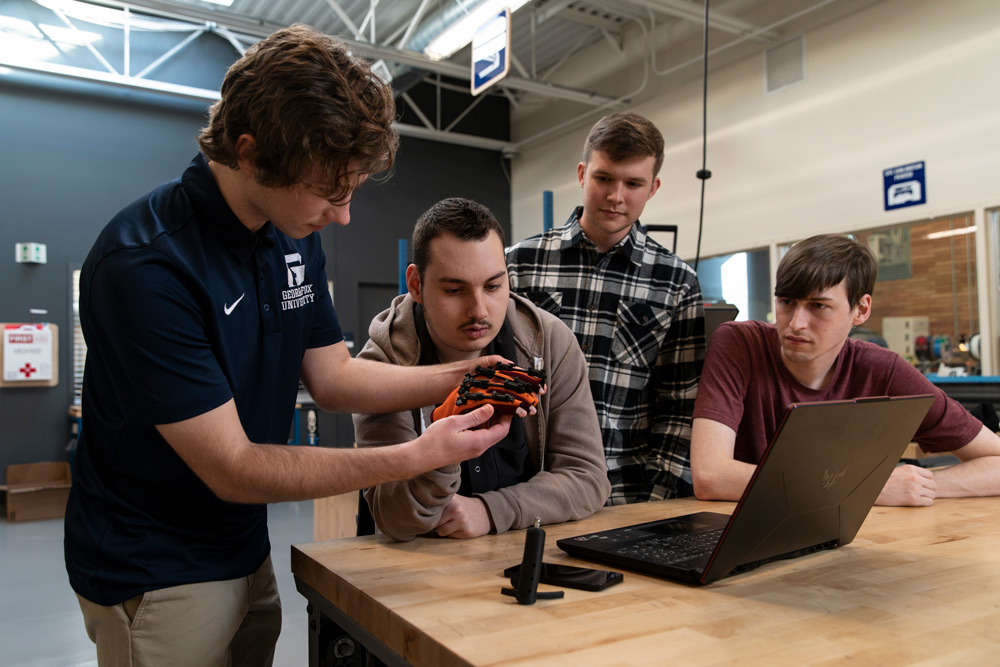
Computer Engineering Concentration
At A Glance
Program Type
Concentration of the engineering major (BS)
Accreditation
Northwest Commission on Colleges and Universities (NWCCU), Accreditation Board for Engineering and Technology (ABET)
Recognition
U.S. News and World Report “Best Undergraduate” engineering program
On this page:

Looking to make an impact in the digital world? Consider studying computer engineering as a concentration within George Fox's engineering major, which will put you in position to test, design and develop solutions for the information-driven systems that shape everyday life.
There’s no denying we are becoming increasingly dependent on computers to guide us (Google Maps and Waze, anyone?), entertain us (hello, Netflix and TikTok), assist us (Alexa? Siri? Are you listening?) and inform us (thanks, X!). For that reason, career opportunities in the field of computer engineering abound.
In a nutshell, computer engineers embed computers in machines and systems, build networks to transfer data, and develop ways to make computers more efficient and capable. They are uniquely prepared to design solutions for a wide variety of applications, including communications, controls, avionics, graphics processing, and robotics.
Think of the many ways you can use your computer engineering training to improve everyday life for millions!
- #1 Christian engineering program in the West - U.S. News (2025)

Servant Engineering: Creative Solutions for the Underserved
We take Christ's call to use our God-given gifts and abilities to serve others. To put that into practice, the Servant Engineering program is a core curricular requirement. In it, you will team up with industry professionals to research, design and deliver engineering solutions to address humanitarian needs.
All our third-year students work on interdisciplinary teams, creating solutions to significant technical challenges through a human-centered design approach.
Among our recent projects:
- Clean cook-stove technologies for meeting the basic needs of refugees, impoverished people and communities in the developing world
- Augmentative communication and physical therapy devices for patients and staff at the Providence Center for Medically Fragile Children in Portland
- Design of a bridge at a ranch for fatherless youth in Yamhill, Oregon
- An auto-resistive enhancement to an exercise bicycle for use in focused physical therapy
- Rugged wheelchair designs for individuals suffering with cerebral palsy in the slums of Nairobi, Kenya
- Creation of a prosthetic device to assist one of our own – an engineering student born with symbrachydactyly, a condition characterized by limb abnormalities
- Design of “The Bouncinator 3000,” a custom-made device that gives a young girl with physical disabilities newfound freedom
Mentorship Opportunities
Students in the engineering program have the opportunity to engage in industry mentorship through the Ignite program. As an Ignite member, you are matched with Christians in the industry. You’ll meet monthly to discover opportunities, develop connections, address career gaps, and ask questions.
Program Distinctives Why Study Computer Engineering at George Fox?
-
The hands-on experience you obtain working on design-build projects in collaborative multi-disciplinary teams begins day one of your freshman year.
-
You will design and fabricate electrical systems in courses spanning microelectronics, microwaves and RF, communications, electrical power systems, electromagnetics, and digital and embedded systems.
-
You’ll get the chance to work on various projects using embedded microcontrollers.
-
You will be tasked to design and build a small-scale electrical micro-grid for a developing country.
-
You will engage in a year-long multi-disciplinary (e.g. computer scientists, electrical, computer, mechanical and biomedical engineers) senior design experience that partners teams with industry partners.
Courses / Curriculum What Will I Study?
Our curriculum covers all the major technical areas of computer engineering, including networking, computer software, design automation, artificial intelligence, embedded systems, biomedical and cybersecurity. Your course of study will include the following areas:
- Computer programming
- Electronic circuits
- Microelectronic circuits
- Digital systems
- Microprocessors
- Embedded systems
- Electrical power systems
- Signals
- Data structures
- Algorithms
- Operating systems
- Data communications
Cornerstone Core
The Cornerstone Core is a set of 12 courses across 10 academic disciplines that undergraduate students take at George Fox to cultivate their character within the Christian context.
As an alternative to Cornerstone Core, students can participate in our great books honors program.
Computer Engineering Requirements
×Computer Engineering (54-55 credit hours)
Complete the following
Choose one additional math or science elective from the following:
Bachelors (BS) in Engineering Requirements
×Required for all concentrations
Complete the following:
Complete the following.
Concentrations (53-55) - choose one
Complete the following courses
Choose one of the following three sequences:
Medical Device Sequence
Pre-PT Sequence
Pre-OT Sequence
Complete the following
Complete the following:
Complete the following
Choose one additional math or science elective from the following:
Complete the following
Choose one additional math or science elective from the following:
Complete the following:
Choose two of the following:
Choose one of the following:

Our spaces/Where Will I Learn?
Maker Space: Where Innovative Ideas Come to Life
The facility includes:
- A 24-station computing lab
- Eight meeting rooms with 48-inch monitors
- A wood shop with a large computer numerical control (CNC) router
- A metal shop with a CNC milling machine
- And so much more
These spaces surround an open configurable collaboration space known as "the Hub," a 6,000-square-foot area used by students representing a wide range of majors. The computer labs have the processors and computer systems needed to accommodate the demands of our major.
Career Outlook What’s After George Fox
Employment of Computer Hardware engineers is projected to grow 7% from 2024 to 2034, according to the U.S. Bureau of Labor Statistics, faster than the average for all occupations.
Demand for computer hardware engineers is expected to grow, as these workers are needed to design parts for manufactured products that use processors and other components, such as household appliances, medical devices, and automobiles.
- Electrical Failure Analysis Engineer, Intel
- Embedded Software Design Engineer, Tektronix
- Semiconductor Design Engineer, Teradyne
- Reliability Engineer, Lattice Semiconductor
- Various engineering positions, Daimler Trucks North America
- Applications Engineer, MCAD Technologies
- Development Engineer, Contech Engineered Solutions
- Project Engineer, Anderson Construction
- Civil Design Engineer, KPFF Consulting Engineers
- Teradyne, Portland
- CUI, Portland
- Intel, Beaverton, Oregon
- Lattice Semiconductor, Portland
- HP, Boise, Idaho
- 3D Systems, Wilsonville, Oregon
- Tektronix, Beaverton, Oregon
- Climax, Newberg, Oregon
- Cascade Steel, McMinnville, Oregon
- MIT (Mechanical Engineering)
- Cal Poly (Electrical Engineering)
- Johns Hopkins University (Biomedical Engineering)
- Purdue University (Mechanical Engineering, Astronautics Engineering)
- USC (Astronautical Engineering)
- Virginia Tech (Biomedical Engineering)
- Wake Forest (Biomedical Engineering)
- UC San Diego
- Oregon State University (Electrical/Computer Engineering, Civil Engineering, Mechanical Engineering)
- University of Washington (Electrical/Computer Engineering, Mechanical Engineering)

Grapes of Math
They’re calling it the Vitibot. The name isn’t official, but a student designed a sticker with the name and it stuck – a clever combination of the term “viticulture” (the science of grapes) with “robot.”
One of the longest-running senior design capstone projects for George Fox computer science and engineering students, the Vitibot moves closer each year to the goal – a product the wine industry surrounding the university is eager to see: a rover that can autonomously traverse a vineyard, gathering image data, to accurately predict the grape yield months before harvest.

Zachery Koppert
George Fox has academically prepared me and other engineers beyond the expectations of the industry. I feel very blessed to have received such a firm understanding of the basics so that I could enter the industry ready to grow even more.
Request Information About Computer Engineering
